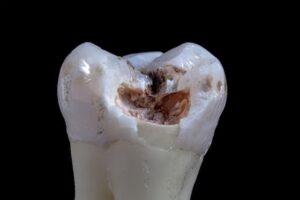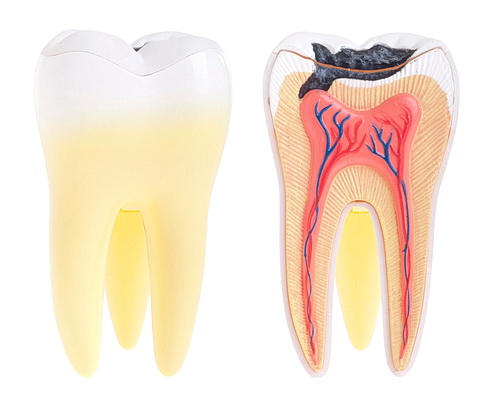
Tooth decay or cavity formation is one of the most prevalent oral health issues in the US and the world. It is an ongoing process that can lead to serious consequences in oral health and in particular, your overall health.
According to a report furnished by the National Center for Health Statistics of the CDC, around 90% of US adults are suffering from the problem of dental caries (a scientific term for tooth decay).
Another survey indicates that 42% of children (between 2 to 11 years) in the US are facing the problem of tooth decay and cavities. More alarming is the issue that more than half of them haven’t undergone any treatment. The American Dental Health Association has termed tooth decay as the most chronic health problem among the child population in the US.
Consequences of Tooth Decay
Many people treat tooth decay as a natural course of growing old, however, this is not the case. Tooth decay possesses some serious ramifications if not treated appropriately:
- Gingivitis or in more severe cases, periodontal (gum) disease will develop
- Tooth decay with severe cavity formations and cuts causes intense chronic pain
- Decayed teeth infested with bacteria produce odor in the mouth resulting in bad breath.
- Tooth decay of a higher degree can result in inflammation and the formation of abscessed teeth due to the infection of periapical tissues.
- At the end stage of tooth decay, dentists advise extraction of the affected tooth, leaving the space empty which can cause misalignment of the teeth.
On the whole, tooth decay significantly imposes major inconveniences and can severely affect the well-being of an otherwise healthy individual.
Dynamics of Tooth Decay
Unlike other diseases caused by specific viruses and groups of infectious bacteria, tooth decay is prompted by the presence of acidogenic bacteria in the mouth. In normal circumstances, these bacteria get neutralized by saliva. However, in a poor upkeep routine of oral and dental health, the remnants of carbohydrates, especially glucose interact with acidogenic bacteria.
The bacteria break down glucose and sugar by creating acid as a by-product of their activity. This bacterial action transforms the oral environment into an acidic one which is harmful to teeth enamel, the peripheral covering made of phosphate and calcium.
Once enamel gets eroded due to the higher levels of acidity, dentin starts to get exposed to acidic reactions. The structure of dentin is softer than enamel, so the tooth decay process gets expedited.
Causes
Apart from poor dental hygiene, several other factors can also set off tooth decay.
Deep Teeth Pits and Fissures
Some individuals inherently have deep crevices and pits in their teeth. This type of tooth structure is ideal for the buildup of plaque and acidogenic bacteria. To prevent tooth decay in people with deep tooth fissures, dentists use dental sealants.
Inviting Sugar into Your Body

Sugar, as good as it tastes is a prime culprit for tooth decay. And it is not only candy or soda. As previously discussed, carbohydrates with rich sugar content are one of the main sources of making the oral environment acidic.
With a greater proportion of sugary foods in your diet, you are not only inviting obesity, but you are also making your oral cavity more susceptible to tooth decay. Drinks acidic in nature such as carbonated sodas and fruit juices also assist the process of tooth decay (See image above). Therefore, it is necessary to have moderation in your daily diet with all such dietary items, even if you are taking good care of your oral health.
Dry Mouth (Xerostomia)
Dry mouth is a condition in which salivary glands in the mouth fail to produce enough amount of saliva required to maintain the acid-base balance of the oral cavity. A dry mouth is more vulnerable to acidogenic bacterial reactions.
A well-practiced physician and dentist can help patients with the problem of dry mouth issues. Non-prescription remedies for dry mouth include limiting caffeine intake and smoking. Sugar-free gum and candies are also used for sufficient saliva production.
Tooth Grinding (Bruxism)
Other than the detrimental bacterial actions, tooth grinding can also bring about the decaying process. In bruxism, intense clenching of teeth occurs during sleep due to stress and anxiety. The resultant abrasion also destroys the enamel and exposes the inner dentin to bacterial reactions. Therefore, treatment of bruxism is necessary for the prevention of tooth decay.
Tooth Decay Prevention
How to maintain good teeth and gums is essentially common knowledge, but we’ll discuss them briefly here:
Brush Daily

Like the commercial, be sure to brush after every meal. If that is not feasible, brush in the morning and at night. Soft brushes are better than hard brushes and you should brush your teeth for at least two minutes each time. Dentists do recommend using electric toothbrushes over manual ones.
Floss Daily
Brushing isn’t the only preventive technique to help prevent the buildup of plaque. Flossing is just as important. Without daily flossing, bacteria will accumulate in the spaces between the teeth. These are areas where brushing is not that helpful. By flossing in the spaces between the teeth, you help keep the bacteria out and consequently, the plaque and tartar will not build up.
Visit Your Dentist
Needless to say, the above prevention methods are only part of the action you can take towards good oral health. Visit your dentist for a routine examination and a cleaning twice a year.
It is quite apparent that a good oral health regimen is the key to the prevention of tooth decay.
Summary
Teeth will begin to decay when sugar combines with bacteria to form acid. This acid, also known as plaque will gradually eat away at the enamel of the tooth and if not corrected, will work its way down towards the second layer, called dentin. When this happens, cavities are formed. If you haven’t been to the dentist, now is the time to go before your cavities reach the next layer, called the pulp and the possibility of root canal work may be necessary.
Learn more in this video on the hows, whys, and protection against tooth decay.





